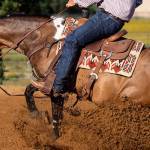Hyaluronic Acid Supports Muscle Repair in Performance Horses

Natural muscle healing following exercise depends on normal inflammation processes. Even though hyaluronic acid exerts anti-inflammatory effects when administered intravenously, those effects do not impede muscle healing, according to recent research.
“Many of us are familiar with hyaluronic acid as a joint supplement. Synovate HA, formulated by Kentucky Equine Research, is a high molecular weight supplement that contributes to cartilage health and elasticity, joint fluid viscoelasticity, and lubrication of the entire joint mechanism. Synovate HA also exerts anti-inflammatory properties,” explained Ashley Fowler, Ph.D., a nutritionist for Kentucky Equine Research.
In addition to Synovate HA, a liquid formulation top-dressed onto feed, hyaluronic acid is available as an injectable product, also indicated for supporting joint health like oral hyaluronic acid products. Further, this injectable product is used by some trainers before competition for presumptive pain relief properties.
This makes sense given that all muscles are damaged during strenuous exercise.
“Repair of those muscles, however, is initiated by an acute inflammatory response. Disruption of the acute inflammatory response could be detrimental to equine athletes, delaying muscle repair and recovery,” said Fowler.
To determine if hyaluronic acid exerts potentially detrimental anti-inflammatory effects on the muscle in the immediate postexercise period, 12 Thoroughbred horses were studied.*
Muscle biopsies were obtained from all 12 horses at the start of the study period. Six horses then received 40 mg of hyaluronic acid intravenously once weekly for three weeks, while the remaining six horses served as untreated controls. On day 35 of the study, all horses underwent a submaximal exercise test that involved four repetitions of 6 minutes of walk, 14 minutes of trot, and 10 minutes of canter. Muscle biopsies were repeated one hour following the exercise test.
Genetic material—ribonucleic acid or RNA—was extracted from the muscle cells and the expression of various genes, primarily those involved in inflammation, were compared between the hyaluronic acid and control groups.
“Before exercise, genes involved in inflammation were lower in the hyaluronic acid group compared to the control, suggesting that hyaluronic acid has anti-inflammatory effects. Following exercise, however, the expression of inflammatory genes was increased in all horses. Thus, hyaluronic acid did not suppress the normal inflammatory response to exercise,” Fowler explained.
In summary, hyaluronic acid possesses anti-inflammatory effects in resting equine skeletal muscle, but those effects do not disrupt post-exercise muscle inflammation.
Further research into the beneficial effects of hyaluronic acid beyond joint health is ongoing.
*Gregg, S.R., M.R. Barshick, and S.E. Johnson. 2023. Intravenous injection of sodium hyaluronate diminishes basal inflammatory gene expression in equine skeletal muscle. Animals (Basel) 13(19):3030.








